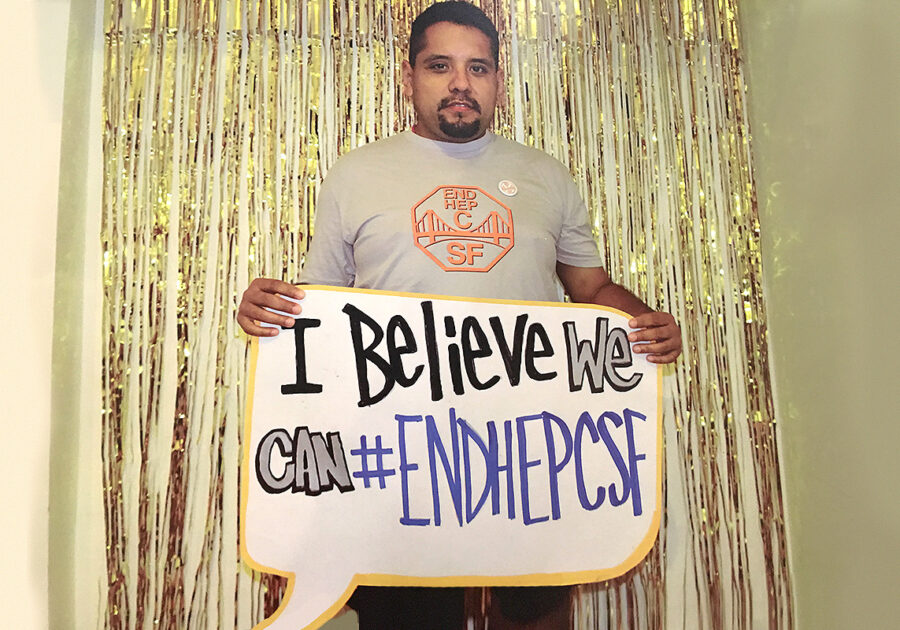Hepatitis C Testing, Treatment & Navigation
Hepatitis C testing and treatment, linkage to care, and other sexual health services are provided by our sexual health clinical program, Magnet. For community members who have a relationship with substances, drop-in testing and clinical services are also provided at our 6th Street Center.

Hepatitis C Virus (HCV) Testing
We provide free hepatitis C virus testing, treatment, cure and support for people in our communities–including people who have or currently inject. We strongly believe that everyone living with HCV deserves to know they are HCV-positive and that HCV cure is an option.
Hepatitis C is a liver infection caused by the hepatitis C virus (HCV). Infection with the virus causes liver inflammation and can cause liver disease.
Hepatitis C is transmitted from contact with infected blood. You can get infected if even a small amount of infected blood gets into your bloodstream. Sharing needles, syringes, or other equipment to inject drugs can transmit HCV. It’s also possible to transmit hepatitis C by sharing toothbrushes, razors, or tattoo and piercing equipment.
Hepatitis C can also be acquired through sex and usually happens during unprotected anal sex. Risk of transmission goes up with any sexual activity that damages the lining of the anus — such as fisting, sex sessions that last a long time or rough sex. Group sex, party drug use before sex and using unwashed sex toys can also put you at risk of hepatitis C if you’re exposed to blood or you have breaks in your skin.
The hepatitis C virus also lives in semen, but whether or not this adds to the risk of transmitting hepatitis C during unprotected anal sex is unknown.
Blood tests are used to diagnose hepatitis C. The first is called an HCV antibody test. This is followed up with a test that confirms the presence of the virus.
If you’ve been diagnosed with hepatitis C, call us discuss your options for treatment at 415-350-2900.
If you’re living with HIV, you should have a hepatitis C test at least once a year. Testing every 6 months is recommended for people who have unprotected anal sex, have had more than 10 sex partners within six months, engaged in group sex, or inject drugs.
Our Hepatitis C Wellness program connects enrolled clients with free onsite treatment and support. This community-based hepatitis support group offers a space for members to take medication, check in with peers, and share their experiences living with hepatitis C.
- Free hepatitis C testing and treatment.
- Medication adherence, counseling, and support.
- Secure locker storage for medication.
- Re-infection prevention.
- Support and treatment groups.
- Linkage to full healthcare services.
- Hep A and hep B vaccines, flu shots, and wound care.
Unlike hepatitis A and hepatitis B, it is not possible to develop immunity to the hepatitis C virus. You could get re-infected if you come into contact with the virus again.
If you are living with hepatitis C:
- Use condoms and either water-based or silicon-based lube during sex.
- Cover any cuts or wounds with a sterile waterproof dressing.
- If you cut yourself, carefully clean your blood off any surfaces with bleach and cold water.
If you’re living with hepatitis C & HIV:
- You can safely get treatment for both infections, although usually not beginning at the same time since this can make side effects worse. (Getting HIV under control is usually the first priority.)
- You may have higher HIV viral loads, but probably won’t experience faster HIV disease progression.
You may have a higher concentration of the hepatitis C virus in your body fluids. - You may have more difficulty getting an accurate hepatitis C test result, particularly if your CD4 count is low.
- You must have your liver enzymes monitored regularly since HIV medications can cause liver inflammation or damage.
Almost everyone living with hepatitis C can now be cured with an 8 to 12 week, once-a-day medication. Newer treatments for hepatitis C are extremely well tolerated with few side effects, and highly effective at clearing the virus.
Some people find complementary therapies and lifestyle changes to be helpful in managing hepatitis C symptoms.
No, you do not need proof of insurance or other documentation to get started.
No, a vaccine for hepatitis C does not exist, but you can reduce your risk of infection.
- Use condoms during anal sex, over insertive sex toys, and if there is blood or other STIs. Do not use oil-based lubricants with condoms, as these lubes may cause condoms to break.
- Wear disposable gloves and use water- or silicone-based lube during fisting.
Wash hands and sex toys before and after sex and between partners - Always use new injection equipment. Don’t share injection equipment like needles, syringes, swabs, spoons, filters, water or tourniquets.
- Wash your hands before and after using injection drugs
- Don’t share personal items like toothbrushes, razors, nail clippers, or nail scissors
- Make sure body artists use new and sterile equipment if you get tattoos, body piercings or other body art.
- Wear disposable gloves if you give someone first-aid or are cleaning up blood or other body fluids.
To find more hepatitis C testing and treatment resources, please visit End Hep C SF.
...I owe my life to the program. All of the staff work really hard to make sure everyone is helped as much as possible.Participant, Hepatitis C Wellness program






